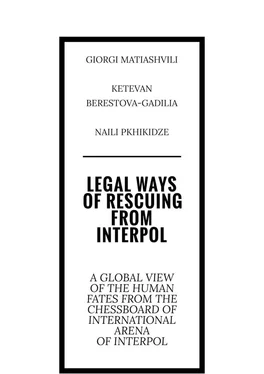Giorgi Matiashvili - Legal ways of rescuing from Interpol. A global view of the human fates from the chessboard of international arena of Interpol
Здесь есть возможность читать онлайн «Giorgi Matiashvili - Legal ways of rescuing from Interpol. A global view of the human fates from the chessboard of international arena of Interpol» — ознакомительный отрывок электронной книги совершенно бесплатно, а после прочтения отрывка купить полную версию. В некоторых случаях можно слушать аудио, скачать через торрент в формате fb2 и присутствует краткое содержание. ISBN: , Жанр: Политика, Публицистика, Юриспруденция, Руководства, на английском языке. Описание произведения, (предисловие) а так же отзывы посетителей доступны на портале библиотеки ЛибКат.
- Название:Legal ways of rescuing from Interpol. A global view of the human fates from the chessboard of international arena of Interpol
- Автор:
- Жанр:
- Год:неизвестен
- ISBN:9785005618610
- Рейтинг книги:2.5 / 5. Голосов: 2
-
Избранное:Добавить в избранное
- Отзывы:
-
Ваша оценка:
- 60
- 1
- 2
- 3
- 4
- 5
Legal ways of rescuing from Interpol. A global view of the human fates from the chessboard of international arena of Interpol: краткое содержание, описание и аннотация
Предлагаем к чтению аннотацию, описание, краткое содержание или предисловие (зависит от того, что написал сам автор книги «Legal ways of rescuing from Interpol. A global view of the human fates from the chessboard of international arena of Interpol»). Если вы не нашли необходимую информацию о книге — напишите в комментариях, мы постараемся отыскать её.
Legal ways of rescuing from Interpol. A global view of the human fates from the chessboard of international arena of Interpol — читать онлайн ознакомительный отрывок
Ниже представлен текст книги, разбитый по страницам. Система сохранения места последней прочитанной страницы, позволяет с удобством читать онлайн бесплатно книгу «Legal ways of rescuing from Interpol. A global view of the human fates from the chessboard of international arena of Interpol», без необходимости каждый раз заново искать на чём Вы остановились. Поставьте закладку, и сможете в любой момент перейти на страницу, на которой закончили чтение.
Интервал:
Закладка:
Domestic lawmaking is implemented through the development and adoption by the General Assembly of resolutions on certain aspects of international cooperation in the fight against crime and certain types of crime. For example, at the 77th session of the General Assembly in St. Petersburg, in 2008, resolutions were adopted in relation to international cooperation in the fight against terroristic crimes, computer crimes, counterfeit medical products and some other issues. Interpol’s participation in international cooperation in the suppression of expectable or committed crimes, including by conducting, if necessary, operational search actions, is carried out within the framework of information assistance. Such assistance is carried out: by providing information support for international search and criminal records and by providing information support for cooperation in the fight against certain types of crimes.
Within the framework of Interpol, such information support is organized by the General Secretariat according to a special methodology and is regulated by: – Rules for the use of information in international police cooperation, adopted by General Assembly Resolution AG-2005-RES-15 (Berlin, 2005); Adopted in their development by the Resolution of the General Assembly AG-2007-RES-09 (Marrakech, 2007) and supplemented by Resolution AG-2008-RES-14 (St. Petersburg, 2008); Rules for the implementation of the rules for the use of information in international police cooperation.
By statute, Interpol must be a strictly apolitical instrument of cooperation. According to article 3 of the Interpol statute adopted more than sixty years ago and detailed clarifications issued in subsequent years, within the framework of Interpol, countries must cooperate exclusively in the investigation of criminal offenses and not use this structure for political purposes, prohibits the organization from carrying out any interference or activities of political, military, religious or racial nature (article 3 of the statute). The trump of the Interpol is its informational resources, which have been formed over the years. Already by the beginning of the 70s of the last century, on the threshold of the computer era, the Interpol card file contained more than one and a half million cards with the names of criminals. This is a tool for information sharing between law enforcement agencies of different countries. Nowadays, the Interpol General Secretariat in the city of Lyon, has databases containing millions of record entries about criminals, missing peopled, stolen or lost documents, false documents, stolen vehicles, fingerprints, DNA, terrorist organizations and others. The telecommunications system used by Interpol enables law enforcement officers of the member countries of the organization to exchange operational information and receive information of interest to them from foreign colleagues in the shortest possible time. It also serves for remote access to the criminal records of the Interpol General Secretariat in real time. Every year, as a result of checking these records throughout the world, hundreds of dangerous criminals are identified and detained, terrorists using fabricated documents are identified, and stolen and exported cars are found and returned to their rightful owners.
It should be noted, that in the context of the processes of globalization, regional economic and political integration, accompanied by the strengthening and deepening of criminal integration in different regions of the planet, Interpol has concentrated its resources and efforts at the global level and it is only a global police information network, and the international constituent of modern crime requires not only information but also joint actions to suppress, investigate and detect crimes. According to the charter of Interpol, this is not allowed (the article 130—151). Therefore, in order to achieve the abovementioned goals, it was necessary to create regional organizations for cooperation between law enforcement agencies, vested with special competence in international cooperation in the field of criminal justice.
The first such agency was the European police organization – (Europol). It coordinates the intelligence-gathering activities of the police and other competent authorities of the EU member states, the collection, analysis, sharing and exchange of information about crimes and persons involved in their commission. This organization has the right to put questions before member states on the creation of joint investigation groups, include their employees in their composition, as well as to take part in joint investigations and solve other tasks. European Police Office is based in the Hague. The main tasks of the European Police Office are to coordinate the work of national services in the fight against international organized crime and to improve the exchange of information between national police services. Among the main directions of Europol’s work are the fight against terrorism, illegal arms trade, drug trafficking, human trafficking, child pornography and money laundering.
Since February 2020, Europol has been coordinating the work of the police services of the 27 member-states of the European Union.
Europol currently has about 630 employees, of which about 120 are Europol Liaison Officers (ELOs), dispatched to Europol by EU Member-States as representatives of their national law enforcement agencies.
Until today, other organizations have similar capabilities at the regional level, including the European Union agency for Criminal Justice Cooperation (Eurojust). Eurojust is composed of prosecutors, judges or police officers, with equivalent powers from each state of EU. Its task is to improve the efficiency of national authorities when they are dealing with investigations and judicial hearing of cross-border and organized crime. The administrative center is in the city of the Hague in the Netherlands, it was founded by the European Union.
As well as, the European Anti-Fraud Office (OLAF) (abbr. «European Anti-Fraud Office», commonly used abbreviation «OLAF», in French «Office de Lutte Anti-Fraude») is based within the European Commission to combat fraud in the execution of programs and European Union policies. The Bureau is an independent organization working with national anti-fraud agencies and corruption. The Bureau was created in 1999 by a decision of the European Commission to replace the Department on the fight against fraud (Unité de coordination de lutte anti-fraude), the competence of which was limited only to the Commission itself. It is located in Brussels in the capital of Belgium.
As well as, American Police Community (Ameripol) – Police Community of the Americas, PCA; This is a continental police international organization created in 2007, the main task of which is the fight against drugs. Ameripol headquarters is located in the city of Bogota in Colombia. Representatives of 18 countries officially created Ameripol on November 14, 2007.
& 3. The history of the creation of the international organization Interpol
In 1914, the princes of Monaco Albert I was robbed. And the thieves, having carried away a box with family jewels from his palace, fled abroad. In the same year, the prince initiated the convening of the International Congress of Criminal Police in order to call cooperation with the police authorities of other countries, which included 24 states. The agenda included the following items: The international search for criminals, the unification of the extradition procedure, the creation of an international data bank for saving criminal information, the basic principles of international police cooperation were also acclaimed. The idea of creating an international commission of criminal police and an organization designed to ensure the interaction of law enforcement officers from different countries in the fight against crime were also, stated at the congress. The First World War hindered the execution of this project. Only in 1923, the Second International Criminal Police Congress was held in Vienna, convened on the initiative of the chief of the Austrian and Vienna police, Johann Schober, and the International Criminal Police Commission was established with headquarters in Vienna. The organization was created to fight international criminals. Schober became its first president.
Читать дальшеИнтервал:
Закладка:
Похожие книги на «Legal ways of rescuing from Interpol. A global view of the human fates from the chessboard of international arena of Interpol»
Представляем Вашему вниманию похожие книги на «Legal ways of rescuing from Interpol. A global view of the human fates from the chessboard of international arena of Interpol» списком для выбора. Мы отобрали схожую по названию и смыслу литературу в надежде предоставить читателям больше вариантов отыскать новые, интересные, ещё непрочитанные произведения.
Обсуждение, отзывы о книге «Legal ways of rescuing from Interpol. A global view of the human fates from the chessboard of international arena of Interpol» и просто собственные мнения читателей. Оставьте ваши комментарии, напишите, что Вы думаете о произведении, его смысле или главных героях. Укажите что конкретно понравилось, а что нет, и почему Вы так считаете.












